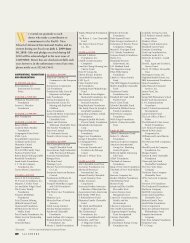Download Current Issue - SAIS
Download Current Issue - SAIS
Download Current Issue - SAIS
You also want an ePaper? Increase the reach of your titles
YUMPU automatically turns print PDFs into web optimized ePapers that Google loves.
Fighting for Farmworkers<br />
Greg asbed ’90 and<br />
laura Germino ’91<br />
arrived at sais determined<br />
to work overseas<br />
after graduation. instead,<br />
they found a worthy cause<br />
closer to home. they fight<br />
for farmworkers’ rights in the<br />
united states, having founded<br />
the Coalition of immokalee<br />
workers (Ciw) in Florida.<br />
asbed shared their story in an<br />
interview with <strong>SAIS</strong>PHERE.<br />
<strong>SAIS</strong>PHERE: One of the great<br />
things about <strong>SAIS</strong> is the sheer<br />
number and variety of causes<br />
to which students and alumni<br />
dedicate themselves. Of all<br />
the humanitarian issues in the<br />
world, why did you choose this<br />
one in particular?<br />
Greg Asbed: Before going<br />
to sais, laura worked with<br />
the Peace Corps in Burkina<br />
Faso, and i was in Haiti with<br />
a national peasant movement<br />
that was deeply involved with<br />
efforts to build democracy<br />
before and after the fall of<br />
Jean Claude Duvalier. we<br />
enrolled at sais with the<br />
intention of returning overseas<br />
and working in development.<br />
while at sais, we<br />
became involved with local<br />
legal services organizations<br />
that specialize in helping<br />
farmworkers defend their<br />
labor rights, one in Pennsylvania<br />
with workers in the<br />
apple harvest and another<br />
on maryland’s eastern shore<br />
with workers in the watermelon<br />
and tomato harvests.<br />
the abysmal working conditions,<br />
abject poverty, and,<br />
most disconcertingly, real<br />
fear—fear of their bosses,<br />
fear of the consequences if<br />
they were to stand up for<br />
their rights, fear of being a<br />
day away from having no<br />
money in their pockets—<br />
left us convinced that there<br />
was plenty of work to be<br />
done right here at home.<br />
S: Can you describe the genesis<br />
of the Immokalee coalition?<br />
GA: after sais, we found<br />
work as community specialists<br />
with a legal services program<br />
based in immokalee,<br />
Fla. the town is the largest<br />
migrant farmworker community<br />
on the east Coast,<br />
though it more resembles a<br />
labor reserve typical of mining<br />
towns in Brazil or south<br />
africa. Our arrival in 1991<br />
coincided with the second<br />
major wave of Haitian immigration<br />
and an increasing<br />
flow of indigenous migrants<br />
from southern mexico and<br />
Guatemala. many of these<br />
new migrants came to the<br />
states with extensive experience<br />
in political and community<br />
organizing; i had worked<br />
with some of them in Haiti.<br />
these highly sophisticated<br />
organizers, forced by political<br />
and economic pressures<br />
to take refuge in the united<br />
states, sparked the birth of<br />
the coalition.<br />
we also work with large<br />
retail food companies to cre-<br />
alumni news & notes<br />
Laura Germino ’91, left, receives the 2010 TIP Hero Award, which<br />
recognizes efforts to combat human trafficking, from U.S. Secretary<br />
of State Hillary Clinton. Germino is the first U.S. recipient.<br />
ate more humane farm labor<br />
conditions. these companies<br />
have leveraged their highvolume<br />
purchasing power<br />
for years to demand lower<br />
and lower prices for produce,<br />
which in turn puts downward<br />
pressure on farm labor wages<br />
and working conditions. Yet,<br />
they also can use that purchasing<br />
power to help raise<br />
wages and demand more<br />
humane working conditions<br />
from their suppliers. Just one<br />
more penny per pound of<br />
tomatoes at the retail level<br />
could raise wages by more<br />
than 60 percent at the farm<br />
level. this is the theory of<br />
change behind the Ciw’s<br />
Campaign for Fair Food.<br />
S: What are your roles within<br />
the coalition?<br />
GA: laura is the Ciw’s antislavery<br />
Campaign coordinator.<br />
she works with<br />
u.s. Department of Justice<br />
officials on the prosecution<br />
of modern-day slavery<br />
operations and trains state<br />
and local law enforcement<br />
and social services agencies<br />
to detect and investigate<br />
human trafficking. my work<br />
focuses on implementing our<br />
Fair Food agreements by<br />
coordinating our efforts with<br />
those of nine multibilliondollar<br />
retail food companies—<br />
including mcDonald’s, whole<br />
Foods and subway—and<br />
more than 90 percent of the<br />
Florida tomato industry in<br />
a partnership to improve<br />
farmworker wages and working<br />
conditions. i also write<br />
and design the Ciw website<br />
(www.ciw-online.org).<br />
S: How has <strong>SAIS</strong> influenced<br />
your careers?<br />
GA: the social Change and<br />
Development Program [now<br />
the international Development<br />
Program], under the<br />
guidance of Professor Grace<br />
Goodell, was a place for students<br />
to consider approaches<br />
to economic and political<br />
development that sometimes<br />
ranged far from the mainstream<br />
and were informed<br />
by the real-world experience<br />
of students, most of whom<br />
had worked for several years<br />
overseas in development.<br />
the combination of academic<br />
freedom and practical rigor<br />
has helped us think and<br />
work outside the bonds of<br />
convention.<br />
2011–2012 81



